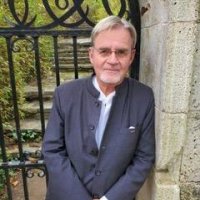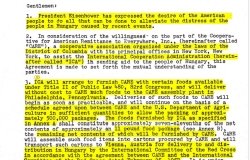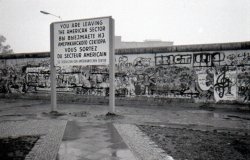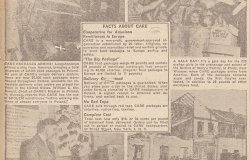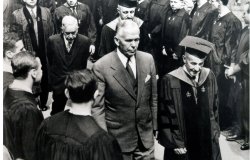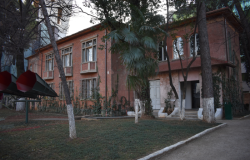Book Launch: J. Robert Oppenheimer: American Prometheus
Kai Bird, Martin Sherwin, and Robert Norris discuss "American Prometheus," the biography of J. Robert Oppenheimer.
Overview
American Prometheus: The Triumph and Tragedy of J. Robert Oppenheimer
20 April 2005
On 20 April 2005 the Cold War International History Project, in cooperation with the Division of US Studies and Scholarly Selection and Service Office, hosted Martin Sherwin and Kai Bird for a launch of their recently published biography, American Prometheus: The Triumph and Tragedy of J. Robert Oppenheimer (Knopf, 2005). Martin Sherwin is the Walter S. Dickson Professor of English and American History at Tufts University and author of A World Destroyed: Hiroshima and Its Legacies (Stanford University Press, 3rd edition, 2003). Kai Bird is a former WWICS Fellow and author of The Color of Truth: McGeorge Bundy and William Bundy: Brothers in Arms (Simon and Schuster, 1998). Robert Stan Norris, a Senior Staff Analyst with the Natural Resources and Defense Council's Nuclear Program and author of Racing for the Bomb: General Leslie R. Groves, the Manhattan Project's Indispensable Man (Steer Forth Press, 1965), provided commentary.
The event was chaired by James Hershberg, Associate Professor of History and International Affairs at George Washington University, a current Public Policy fellow at the Wilson Center, and the author of the James B. Conant: Harvard to Hiroshima and the Making of the Nuclear Age (Knopf, 1993). Following Hershberg's introduction, Bird began his presentation by calling Oppenheimer a modern version of the legendary "Prometheus;" he, too, after "stealing fire from the gods," was publicly tried and punished for his actions. Yet despite the public trials and tribulations, according to Bird and Sherwin, Oppenheimer was an American patriot, and his story is a mirror of the best and worst of the United States.
Oppenheimer's life was "a mess," Sherwin suggested, his personality "stuck in first gear." He contemplated suicide a year after graduating from Harvard College in 1925—but, Sherwin noted, was saved by his discovery of French writer Marcel Proust and quantum physics. Part of his depression, Sherwin contended, might have been due to Oppenheimer's inability to cope with experimental physics. However, in quantum physics, a more theoretical field, Oppenheimer found solace and a new trajectory for his life, one that took him to the heights of nuclear science.
In 1943, with the surprising support of General Leslie R. Groves, Oppenheimer became the founding director of the wartime Los Alamos Laboratory, where the first atomic bombs were assembled. There he became the intellectual leader of American scientists, charged with two related, but not identical, crusades: first, to beat the Germans to the A-Bomb; second, to finish the bomb before the war's end. It was this second crusade that would prove morally problematic for Oppenheimer later in life. After all, Oppenheimer was ultimately, and largely, responsible for the bomb's development and use. Throughout the development and deployment process, Oppenheimer remained involved in every detail, and he went along with the plans of the Roosevelt and Truman administrations. He could have objected to using the bomb, but chose not to, and he prevented an in-depth discussion of the morality of using the bomb from taking place at the Los Alamos lab during the development process. Bird and Sherwin suggested that Oppenheimer might have decided that it was necessary for the bomb to be used before the war ended, so that an understanding of the bomb's power would lead to an international atomic energy treat and prevent the use of the bomb.
As it was, Oppenheimer acquiesced to the use of the bomb under the assumption that the Japanese would not surrender unless completely defeated, either through the use of the bomb or through an invasion of the main island. After the war ended, Oppenheimer began to learn about the negotiations that took place prior to the use of the bomb. The idea that the Japanese might have surrendered even had the bomb not been used shocked Oppenheimer. He resolved never again to consent to any vital action without fully investigating the alternatives. Over time, Oppenheimer became a fierce critic of the nuclear arms race. His opposition to the crash development of the H-Bomb and his refusal to be concerned about the advent of Soviet nuclear weapons earned him the loathing of hardliners in the US government and military, particularly the Air Force.
Rather than descend into a self-defeating spiral of eternal escalation, he asked if the Soviet development of nuclear weapons might not be a blessing in disguise. Decades before SALT, Oppenheimer suggested that the US should strive for sufficiency and arms control rather then superiority. The US, Oppenheimer argued in vain, should use its influence to promote a mutual moratorium on the development of thermonuclear weapons. Yet Oppenheimer was not necessarily opposed to the H-Bomb, but to diverting scarce resources from workable A-Bomb designs to a crash program that he considered scientifically premature and strategically unwarranted. After the "technically so sweet" Edward Teller-Stanislaw Ulam breakthrough towards a workable H-Bomb model in 1951, Oppenheimer dropped his opposition.
Conservative critics never forgave Oppenheimer for what they considered his anti-American ideas. In the McCarthy era, the Atomic Energy Commission (AEC) under Lewis Strauss went on a witch-hunt against Oppenheimer. The government, Bird and Sherwin contended, went so far in attempting to destroy Oppenheimer that it used every method of gaining information, including some that were either inappropriate or illegal, in order to get the AEC review board hearings to move against the scientist. These hearings raised myriad questions about Oppenheimer, such as whether or not he was a member of the communist party or had misled wartime security agents regarding a possible Soviet espionage probe. The authors argue that there was no factual evidence to support such claims. Oppenheimer's reputation and government career had been deeply damaged by the hearings. In an ironic twist of fate, however, the release of the transcripts, and the disclosure of the illegal tactics used for gathering information, eventually led to Strauss' own downfall.
Robert Norris noted the difficulty of gathering sufficient evidence to provide an accurate narrative of any complex individual life such as Oppenheimer's. Many biographers, himself among them, get "wrapped up" in the person they are studying—making an "objective" analysis of facts difficult at best. The fact that sources are often incomplete, biased and out of context multiplies the biographer's difficulties. Norris and Hershberg nonetheless agreed that the authors had been able to provide a far deeper understanding of Oppenheimer the man than was previously available.
Documents & Downloads
Speakers
Hosted By

Cold War International History Project
The Cold War International History Project supports the full and prompt release of historical materials by governments on all sides of the Cold War. Through an award winning Digital Archive, the Project allows scholars, journalists, students, and the interested public to reassess the Cold War and its many contemporary legacies. It is part of the Wilson Center's History and Public Policy Program. Read more
Thank you for your interest in this event. Please send any feedback or questions to our Events staff.

